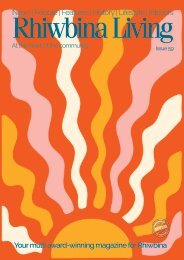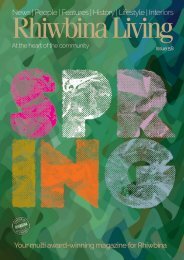Rhiwbina Living 62
Summer 2024
Summer 2024
Create successful ePaper yourself
Turn your PDF publications into a flip-book with our unique Google optimized e-Paper software.
complete once crowds from across<br />
the border belted back the words<br />
with the same vigour. The Guardian<br />
wrote:<br />
‘It’s hard to decide which is the<br />
more improbable – a hall full of<br />
Londoners claiming to be Welsh, or<br />
a Welsh band inspiring such loyalty.’<br />
What is often lost in translation<br />
is its irony. It’s highly unlikely that<br />
Catatonia thanked the Lord they<br />
were Welsh on a daily basis, but<br />
now a band was happy with wearing<br />
its Welshness on its sleeve. As<br />
Cerys Matthews told the Daily<br />
Record:<br />
‘Hopefully, by now people realise<br />
that Wales is brimmed full of<br />
talent and we’re great people with<br />
massive brains.’<br />
Obviously, its chorus can be<br />
easily latched onto and enjoyed<br />
on a superficial level. Yet, it’s so<br />
over the top, how can it be viewed<br />
as anything other than ironic?<br />
Addressing narrow-minded views<br />
of the Welsh, the song’s opening<br />
line depicts stereotypes of a small,<br />
oppressed nation that has little to<br />
offer other than its skill for singing:<br />
‘Deffrwch Cymry cysglyd, Gwlad y<br />
Gan’ (‘Wake up, sleepy Wales, Land<br />
of Song’). It then continues with<br />
more overtly ironic jabs at Welsh<br />
cultural clichés and its history as a<br />
defeated nation.<br />
Therefore, the verses portray the<br />
decades of doubt Wales suffered,<br />
while Cerys’s triumphant howl in<br />
the chorus embodies the rebirth of<br />
a country at last comfortable in its<br />
own skin. When asked by Melody<br />
Maker if the song could become the<br />
new Welsh national anthem, Mark<br />
Roberts replied:<br />
‘Probably not. The melody’s too<br />
difficult to have them singing in the<br />
streets at closing time.’<br />
In ‘Blerwytirhwng?’ The Place of<br />
Welsh Pop Music, Sarah Hill said:<br />
'Catatonia intend to play in the<br />
mainstream culture, but on their<br />
own terms – they do not intend<br />
to conform to the British notion<br />
of what Welshness is, and their<br />
bilingualism is a statement of fact<br />
which needs no justification. That is<br />
‘English’, but not quite.’<br />
If ‘International Velvet’ wasn’t the<br />
national anthem, it was certainly<br />
emblematic of a modernised,<br />
progressive Wales at the end<br />
of the twentieth century, and its<br />
influence resonated in three key<br />
performances in 1999.<br />
At Port Talbot’s Margam Park in<br />
late May, over 30,000 screaming<br />
fans boomed out the chorus as one<br />
with as much gusto as a massed<br />
Welsh choir. Cerys confessed she<br />
Author photo: Catherine Sharples<br />
wept while singing it.<br />
The Margam Park performance<br />
of the song illustrated how much<br />
it had connected with the public.<br />
Days before though, there had<br />
been an overblown rendition<br />
that stripped away its irony and<br />
saw it delve into pantomime. On<br />
Wednesday, 26 May 1999, the<br />
Welsh Assembly was officially<br />
inaugurated with the Voices<br />
of a Nation concert. Top of the<br />
organisers’ list were Catatonia to<br />
sing a certain song to celebrate<br />
the occasion. If only the band<br />
weren’t so busy with preparations<br />
for their Home Internationals gigs in<br />
Llangollen.<br />
Instead, they granted the BBC<br />
permission for a stellar cast to<br />
perform their anthem. Enter stageleft<br />
Tom Jones, Shakin’ Stevens,<br />
Max Boyce, Bonnie Tyler, Charlotte<br />
Church, and Mike Peters et al.<br />
belting it out to a confused live<br />
audience, who couldn’t hear over<br />
fireworks. A song that was penned<br />
as a cheeky jibe had achieved its<br />
aim. As one unimpressed journalist<br />
wrote:<br />
‘The live TV concert to celebrate<br />
the opening of the Welsh Assembly<br />
was an unmitigated disaster…<br />
“International Velvet” should’ve<br />
been a rousing all-star finale,<br />
but instead it was unbelievably<br />
embarrassing for Wales.’<br />
Regardless, ‘International Velvet’<br />
was the perfect song to promote<br />
Wales on the world stage and it was<br />
everywhere from soundtracking<br />
sporting montages to being<br />
referenced by academics as<br />
personifying the transition in postreferendum<br />
optimism.<br />
This buoyant mood was<br />
perpetuated by the Rugby World<br />
Cup, which was hosted in Wales<br />
in 1999. The state-of-the-art<br />
Millennium Stadium was the ideal<br />
new home for Graham Henry’s<br />
exciting squad after a mid-decade<br />
period in the doldrums. Soon to<br />
be labelled ‘The Great Redeemer’,<br />
Henry masterminded a 29–19<br />
victory over South Africa to open<br />
the venue on 26 June 1999.<br />
Three months later, Catatonia were<br />
requested to start the Rugby World<br />
Cup opening ceremony. Forget the<br />
Top 5 singles ‘Mulder and Scully’<br />
and ‘Road Rage’; it was ‘International<br />
Velvet’ – an album track – that the<br />
organisers wanted to be part of a<br />
diverse ceremony celebrating the<br />
nation’s past, present, and future.<br />
With a huge banner declaring<br />
‘Croeso i Gymru’ (‘Welcome to<br />
Wales’), Cerys strutted onstage<br />
and unveiled a Welsh rugby shirt<br />
matched with sequins and sparkly<br />
eyeliner.<br />
Introducing Catatonia, presenter<br />
Alan Wilkins said:<br />
‘This is a momentous day in<br />
sporting history as the magnificent<br />
new Millennium Stadium in Cardiff<br />
hosts the opening ceremony of the<br />
fourth Rugby World Cup.<br />
‘A new spirit in Wales, a new<br />
vibrancy, a new energy, a country<br />
acclaimed as the ‘Land of Song’.<br />
The Welsh love to perform and no<br />
one more so than Catatonia, who<br />
kick us off with their massive hit,<br />
‘International Velvet’. Young, Welsh<br />
talent taking Wales into the new<br />
century.’<br />
With Manic Millennium providing<br />
an epic finale to the decade<br />
a couple of months later, the<br />
fascinating story of Wales in the<br />
’90s is a mind-blowing journey<br />
of growth and confidence that<br />
continues to inspire the country’s<br />
vibrant music scene today.<br />
Wales was a nation finally off its<br />
knees, and standing proudly. If it<br />
was a movie plot, it would all seem<br />
so far-fetched.<br />
Thankfully, it was all true.<br />
International Velvet: How Wales<br />
Conquered the 90s Charts is<br />
published 25th July from Calon,<br />
University of Wales Press.<br />
Featuring fresh analysis and<br />
new interviews, the book charts<br />
how ‘Cool Cymru’ won over the<br />
masses and shows how it inspired<br />
the still-vibrant Welsh music<br />
scene into the 21st century and<br />
beyond.<br />
Born and bred in Whitchurch,<br />
the book's author, Neil Collins<br />
is a writer, former WalesOnline<br />
journalist, and co-host of the<br />
Welsh Music Podcast.<br />
35

















